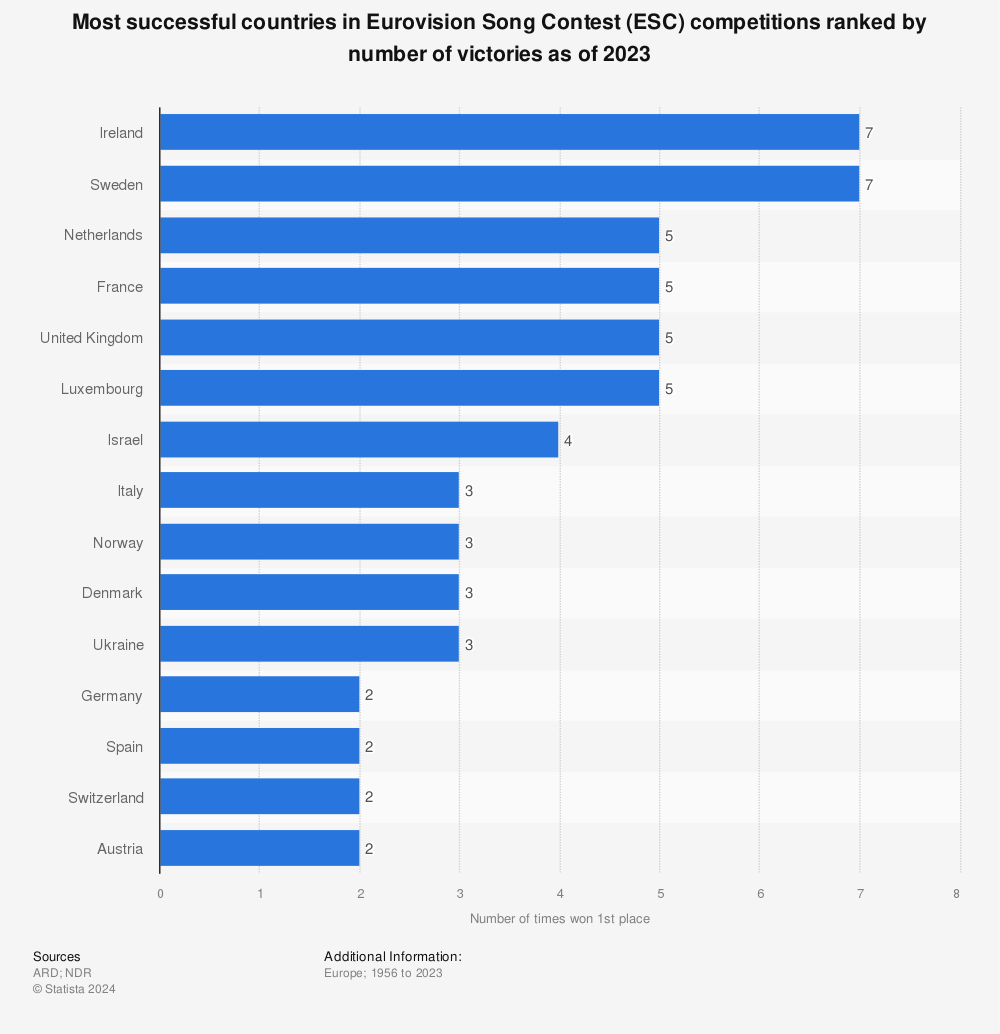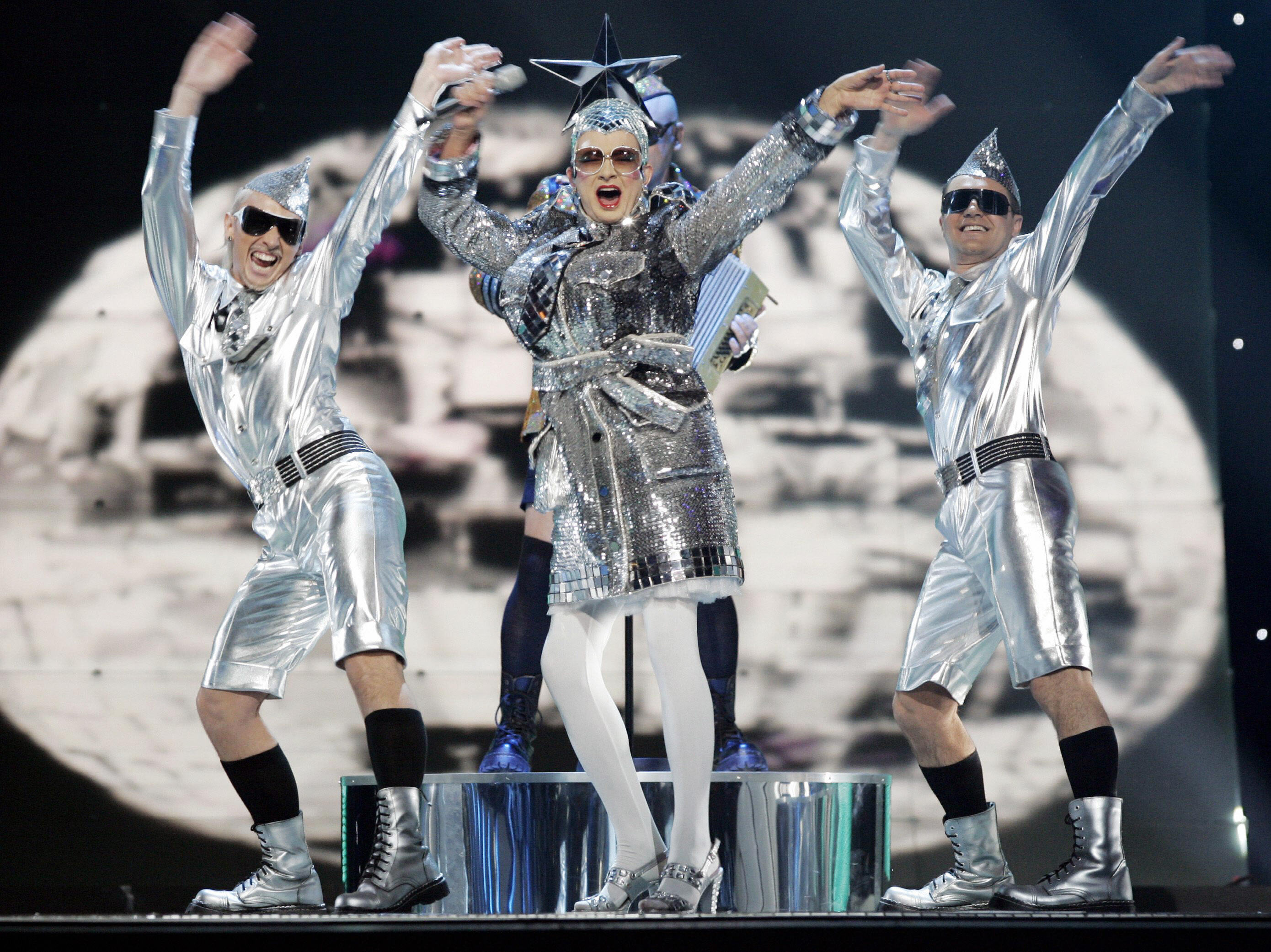Who won most Eurovision. Novedad aquí - Who has won the most times in Eurovision
 Ireland
With 7 victories, Ireland is the most successful country at the contest. Sweden won the contest 6 times, while Luxembourg, France, the Netherlands and the United Kingdom won 5 times.
Ireland
With 7 victories, Ireland is the most successful country at the contest. Sweden won the contest 6 times, while Luxembourg, France, the Netherlands and the United Kingdom won 5 times.Ireland Ireland has won the Eurovision Song Contest a record 7 times in total.
Facts and figures for the Eurovision Song Contest. Ireland won a record 7 times, Luxembourg, France and the United Kingdom 5 times. Sweden and the Netherlands won 4 times.
Right: Luísa Sobral, winning songwriter in 2017 for Portugal. Left: Lys Assia, the first Eurovision winner (1956), and Dima Bilan, winner in 2008. ... Performers and songwriters with multiple wins.| Wins | 3 |
|---|---|
| Name | Johnny Logan |
| Wins as performer | 1980, 1987 |
| Wins as songwriter | 1987, 1992 |

What is the biggest selling Eurovision song of all time
Save Your Kisses For Me In 1976 Brotherhood of Man won the Eurovision Song Contest with Save Your Kisses For Me. The song went on to be one of the biggest selling records of all time.Which was the best Eurovision
1: ABBA: Waterloo (Sweden, 1974) It is also consistently voted the top Eurovision song of all time – and for good reason.The 'Big Five' are the Participating Broadcasters from France, Germany, Italy, Spain and the United Kingdom - the group of countries who via their broadcasters make the biggest financial contribution towards the organisation of the Contest.
Belgium was the first ever country to have received nul points. The most unfortunate victims are Norway and Austria, having each scored "Nul Points" 4 times (Switzerland too, if the semi-finals are counted). As of 2016, it was deemed almost impossible to attain nul points total due to the new voting system.Who won Eurovision last 10 years
All the winners from the history of Eurovision Song Contest| Year | Winner | Points |
|---|---|---|
| 2017 Kyiv | Portugal | 758 |
| 2016 Stockholm | Ukraine | 534 |
| 2015 Vienna | Sweden | 365 |
| 2014 Copenhagen | Austria | 290 |

The withdrawal came during a rise of anti-LGBTQ+ sentiment among the leadership of Hungary and MTVA; while no official reason for the withdrawal was given by the broadcaster, an inside source speaking with the website Index.hu speculated that the contest was considered "too gay" for MTVA to participate.
The most watched Eurovision performances of all time:8) Lordi - 'Hard Rock Hallelujah'7) Netta - 'Toy'6) Måns Zelmerlöw - 'Heroes'5) Loreen - 'Euphoria'4) Hadise - 'Düm Tek Tek'3) SunStroke Project & Olia Tira - 'Run Away'2) Måneskin - 'Zitti e buoni'1) Alexander Rybak - 'Fairytale' Country: Norway.The crown jewel of past Eurovision winners is ABBA, the band that went on to inspire one of the greatest musicals (and subsequent films) of all-time: Mamma Mia!
Save Your Kisses For Me The record-winning total still stands to this day in the contest. The song 'Save Your Kisses For Me' was the biggest-selling Eurovision song of all time selling a phenomenal five million records worldwide, topping the charts in 33 countries.Top 10 most streamed Eurovision songs of all time on SpotifyMahmood and Blanco - 'Brividi' - Italy (2022) 109,136,524 streams.Rosa Linn - 'Snap' - Armenia (2022) 112,563,832 streams.ABBA - 'Waterloo' - Sweden (1974) 196,599,874 streams.Alexander Rybak - 'Fairytale' - Norway (2009) 206,635,644 streams.
Who pays Eurovision
Eurovision is a non-profit event, and financing is typically achieved through a fee from each participating broadcaster, contributions from the host broadcaster and the host city, and commercial revenues from sponsorships, ticket sales, televoting and merchandise.It is one of the "Big Five" countries, along with France, Germany, Italy and Spain, that are automatically prequalified for the final each year as they are the biggest financial contributors to the European Broadcasting Union (EBU).Countries Israel. Israel made its debut in the Eurovision Song Contest in 1973 as the first non-European country granted permission to participate in the event. The EBU allowed Israel to participate since the country's broadcaster was already one of its members.From 1994 to 1996, Italy withdrew again, with RAI citing a lack of interest in participating. Italy returned in 1997, before withdrawing again without explanation, and the country did not participate again until 2011. None of the 20th century Eurovision-winning songs were particularly successful in the Italian charts.Withdrawal. TRT announced they would not participate in the 2013 contest on 14 December 2012, citing dissatisfaction with the rules of the competition; they have yet to return.
Why is Morocco not in Eurovision
At the close of voting, it had received 7 points, all of them from Italy, placing 18th in a field of 19, and ahead of perennial last-place recipient Finland. The country's second-to-last place was a cruel disappointment for Moroccan public television, which decided never to participate in the contest again.The 'Big Five' are the Participating Broadcasters from France, Germany, Italy, Spain and the United Kingdom - the group of countries who via their broadcasters make the biggest financial contribution towards the organisation of the Contest.
Waterloo 1: ABBA: Waterloo (Sweden, 1974) It is also consistently voted the top Eurovision song of all time – and for good reason.
The 'Big Five' are the Participating Broadcasters from France, Germany, Italy, Spain and the United Kingdom - the group of countries who via their broadcasters make the biggest financial contribution towards the organisation of the Contest.The crown jewel of past Eurovision winners is ABBA, the band that went on to inspire one of the greatest musicals (and subsequent films) of all-time: Mamma Mia!Similar articles
- ¿Cuándo juega Rosario Central por la Copa Argentina 2022. Novedad aquí - ¿Cuándo juega Central por la Copa Argentina 2022
- ¿Cómo saber qué cubre mi póliza DKV. Novedad aquí - ¿Cómo saber qué póliza tengo en DKV
- ¿Cuándo es el partido de Real Madrid vs Barcelona. Novedad aquí - ¿Cuándo se juega el clásico 2022
- ¿Cuántos españoles han sido número 1 de la ATP. Novedad aquí - ¿Cuántos españoles han sido número 1 ATP
- ¿Quién va al Mundial Qatar 2022. Novedad aquí - ¿Quién está clasificado para el Mundial 2022
- ¿Cuándo es el clasico Tigres vs Monterrey 2022. Novedad aquí - ¿Cuándo juega Tigres y en qué canal
- ¿Qué dijo Jesús sobre las deudas. Novedad aquí - ¿Cómo pago Jesús la deuda
- ¿Dónde ver la Jornada 3. Novedad aquí - ¿Qué partidos echa DAZN
- ¿Dónde puedo ver los partidos de la Nations League. Novedad aquí - ¿Dónde televisan los partidos de la Nation League
- ¿Cuánto gana el equipo q gane la Europa League. Novedad aquí - ¿Cuánto se cobra por partido ganado Europa League
- ¿Qué equipo chileno ha ganado más veces en Brasil. Novedad aquí - ¿Qué equipo chileno ha ganado más en Brasil
- ¿Cuánto gana Raúl García en el Athletic de Bilbao. Novedad aquí - ¿Cuánto cobra Raúl García en el Atlético de Bilbao
- ¿Quién ha ganado el europeo de baloncesto. Novedad aquí - ¿Quién ha ganado Eurobasket 22
- ¿Qué necesita Panamá para clasificar al Mundial 2022. Novedad aquí - ¿Qué equipo falta para clasificar al Mundial 2022
- ¿Cómo va la final de futsal 2022. Novedad aquí - ¿Quién ganó la final de futsal 2022
Popular articles
- ¿Qué Ligas tiene Star Plus. Novedad aquí - ¿Qué ligas se ven en Star Plus México
- ¿Que no se puede llevar a Italia. Novedad aquí - ¿Qué puedo llevar a Italia
- ¿Cómo saber si un documento es real o falso. Novedad aquí - ¿Cómo saber si un documento es verdadero o falso
- ¿Cuántos equipos juegan play off LEB Oro. Novedad aquí - ¿Cuántos equipos juegan playoff LEB Oro
- ¿Dónde puedo ver la final de la Copa Libertadores. Novedad aquí - ¿Dónde puedo ver la final de la Libertadores 2022
- ¿Que ganó Atlético de Tucumán. Novedad aquí - ¿Qué titulos ganó Atlético Tucumán
- ¿Qué es un equipo de Fantasy. Novedad aquí - ¿Cómo funciona Fantasy
- ¿Dónde está la estatua de Maradona en Nápoles. Novedad aquí - ¿Dónde está el monumento de Maradona en Nápoles
- ¿Cuánto gana un legionario español. Novedad aquí - ¿Cuál es el sueldo de un legionario
- ¿Cuántas veces descendio Luque. Novedad aquí - ¿Cuántas veces descendió Luque
- ¿Cómo saber sobre el reintegro. Novedad aquí - ¿Cómo saber en qué estado se encuentra la devolución de Hacienda
- ¿Cuánto cobra Codere. Novedad aquí - ¿Cómo se cobra en Codere
- ¿Qué significa que se jugará prórroga. Novedad aquí - ¿Qué significa se jugará prórroga
- ¿Cómo se juegan los Cuadrangulares Liga BetPlay 2022. Novedad aquí - ¿Cómo se jugarán las finales de la Liga BetPlay 2022 2
- ¿Cuánto cuesta un curso de basquet. Novedad aquí - ¿Cuánto cuesta un curso de basquetbol